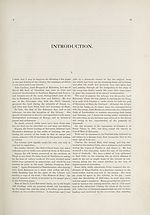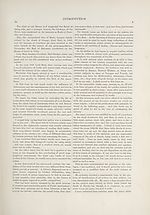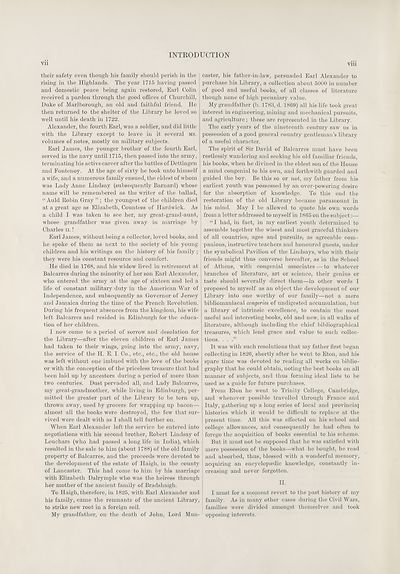Catalogue of the printed books preserved at Haigh Hall, Wigan, Co. Pal. Lancast > A--D
(14) Columns vii and viii
‹‹‹ prev (13)
Columns v and vi
(15) next ›››
Columns ix and x
Download files
Complete book:
Individual page:
Thumbnail gallery: Grid view | List view

INTRODUCTION
Vll
VIU
their safety even though his family should perish in the
rising in the Highlands. The year 1715 having passed
and domestic peace being again restored. Earl Colin
received a pardon through the good offices of Churchill,
Duke of Marlborough, an old and faithful friend. He
then returned to the shelter of the Library he loved so
well until his death in 1722.
Alexander, the fourth Earl, was a soldier, and did little
with the Library except to leave in it several ms.
volumes of notes, mostly on military subjects.
Earl James, the younger brother of the fourth Earl,
served in the navy until 1715, then passed into the army,
terminating his active career after the battles of Dettingen
and Fontenoy. At the age of sixty he took unto himself
a wife, and a numerous family ensued, the eldest of whom
was Lady Anne Lindsay (subsequently Barnard) whose
name will be remembered as the writer of the ballad,
" Auld Robin Gray " ; the youngest of the children died
at a great age as Elizabeth, Countess of Hardwick. As
a child I was taken to see her, my great-grand-aunt,
whose grandfather was given away in marriage by
Charles ii.!
Earl James, without being a collector, loved books, and
he spoke of them as next to the society of his young
children and his writings on the history of his family ;
they were his constant resource and comfort.
He died in 1768, and his widow lived in retirement at
Balcarres during the minority of her son Earl Alexander,
who entered the army at the age of sixteen and led a
life of constant military duty in the American War of
Independence, and subsequently as Governor of Jersey
and Jamaica during the time of the French Revolution.
During his frequent absences from the kingdom, his wife
left Balcarres and resided in Edinburgh for the educa¬
tion of her children.
I now come to a period of sorrow and desolation for
the Library—after the eleven children of Earl James
had taken to their wings, going into the army, navy,
the service of the H. E. I. Co., etc., etc., the old house
was left without one imbued with the love of the books
or with the conception of the priceless treasure that had
been laid up by ancestors during a period of more than
two centuiies. Dust pervaded all, and Lady Balcarres,
my great-grandmother, while living in Edinburgh, per¬
mitted the greater part of the Library to be torn up,
thrown away, used by grocers for wrapping up bacon—
almost all the books were destroyed, the few that sur¬
vived were dealt with as I shall tell further on.
When Earl Alexander left the service he entered into
negotiations with his second brother, Robert Lindsay of
Leuchars (who had passed a long life in India), which
resulted in the sale to him (about 1788) of the old family
property of Balcarres, and the proceeds were devoted to
the development of the estate of Haigh, in the county
of Lancaster. This had come to him by his marriage
with Elizabeth Dalrymple who was the heiress through
her mother of the ancient family of Bradshaigh.
To Haigh, therefore, in 1825, with Earl Alexander and
his family, came the remnants of the ancient Library,
to strike new root in a foreign soil.
My grandfather, on the death of John, Lord Mun-
caster, his father-in-law, persuaded Earl Alexander to
purchase his Library, a collection about 5000 in number
of good and useful books, of all classes of literature
though none of high pecuniary value.
My grandfather (b. 1783, d. 1869) all his life took great
interest in engineering, mining and mechanical pursuits,
and agriculture; these are represented in the Library.
The early years of the nineteenth century saw us in
possession of a good general country gentleman's library
of a useful character.
The spirit of Sir David of Balcarres must have been
restlessly wandering and seeking his old familiar friends,
his books, when he divined in the eldest son of the House
a mind congenial to his own, and forthwith guarded and
guided the boy. Be this so or not, my father from his
earliest youth was possessed by an over-powering desire
for the absorption of knowledge. To this end the
restoration of the old Library became paramount in
his mind. May I be allowed to quote his own words
from a letter addressed to myself in 1865 on the subject:—
"I had, in fact, in my earliest youth determined to
assemble together the wisest and most graceful thinkers
of all countries, ages and pursuitss as agreeable com¬
panions, instructive teachers and honoured guests, under
the symbolical Pavilion of the Lindsays, who with their
friends might thus converse hereafter, as in tlie School
of Athens, with congenial associates — to whatever
branches of literature, art or science, their genius or
taste should severally direct them—in other words I
proposed to myself as an object the development of our
Library into one worthy of our family—not a mere
bibliomaniacal congeries of undigested accumulation, but
a library of intrinsic excellence, to contain the most
useful and interesting books, old and new, in all walks of
literature, although including the chief bibliographical
treasures, which lend grace and value to such collec¬
tions. ..."
It was with such resolutions that my father first began
collecting in 1826, shortly after he went to Eton, and his
spare time was devoted to reading all works on biblio¬
graphy that he could obtain, noting the best books on all
manner of subjects, and thus formhig ideal lists to be
used as a guide for future purchases.
From Eton he went to Trinity College, Cambridge,
and whenever possible travelled through France and
Italy, gathering up a long series of local and provincial
histories which it would be difficult to replace at the
present time. All this was effected on his school and
college allowances, and consequently he had often to
forego the acquisition of books essential to his scheme.
But it must not be supposed that he was satisfied with
mere possession of the books—what he bought, he read
and absorbed, thus, blessed with a wonderful memory,
acquiring an encyclopaedic knowledge, constantly in¬
creasing and never forgotten.
II.
I must for a moment revert to the past historj' of my
family. As in many other cases during the Civil Wars,
families were divided amongst themselves and took
opposing interests.
Vll
VIU
their safety even though his family should perish in the
rising in the Highlands. The year 1715 having passed
and domestic peace being again restored. Earl Colin
received a pardon through the good offices of Churchill,
Duke of Marlborough, an old and faithful friend. He
then returned to the shelter of the Library he loved so
well until his death in 1722.
Alexander, the fourth Earl, was a soldier, and did little
with the Library except to leave in it several ms.
volumes of notes, mostly on military subjects.
Earl James, the younger brother of the fourth Earl,
served in the navy until 1715, then passed into the army,
terminating his active career after the battles of Dettingen
and Fontenoy. At the age of sixty he took unto himself
a wife, and a numerous family ensued, the eldest of whom
was Lady Anne Lindsay (subsequently Barnard) whose
name will be remembered as the writer of the ballad,
" Auld Robin Gray " ; the youngest of the children died
at a great age as Elizabeth, Countess of Hardwick. As
a child I was taken to see her, my great-grand-aunt,
whose grandfather was given away in marriage by
Charles ii.!
Earl James, without being a collector, loved books, and
he spoke of them as next to the society of his young
children and his writings on the history of his family ;
they were his constant resource and comfort.
He died in 1768, and his widow lived in retirement at
Balcarres during the minority of her son Earl Alexander,
who entered the army at the age of sixteen and led a
life of constant military duty in the American War of
Independence, and subsequently as Governor of Jersey
and Jamaica during the time of the French Revolution.
During his frequent absences from the kingdom, his wife
left Balcarres and resided in Edinburgh for the educa¬
tion of her children.
I now come to a period of sorrow and desolation for
the Library—after the eleven children of Earl James
had taken to their wings, going into the army, navy,
the service of the H. E. I. Co., etc., etc., the old house
was left without one imbued with the love of the books
or with the conception of the priceless treasure that had
been laid up by ancestors during a period of more than
two centuiies. Dust pervaded all, and Lady Balcarres,
my great-grandmother, while living in Edinburgh, per¬
mitted the greater part of the Library to be torn up,
thrown away, used by grocers for wrapping up bacon—
almost all the books were destroyed, the few that sur¬
vived were dealt with as I shall tell further on.
When Earl Alexander left the service he entered into
negotiations with his second brother, Robert Lindsay of
Leuchars (who had passed a long life in India), which
resulted in the sale to him (about 1788) of the old family
property of Balcarres, and the proceeds were devoted to
the development of the estate of Haigh, in the county
of Lancaster. This had come to him by his marriage
with Elizabeth Dalrymple who was the heiress through
her mother of the ancient family of Bradshaigh.
To Haigh, therefore, in 1825, with Earl Alexander and
his family, came the remnants of the ancient Library,
to strike new root in a foreign soil.
My grandfather, on the death of John, Lord Mun-
caster, his father-in-law, persuaded Earl Alexander to
purchase his Library, a collection about 5000 in number
of good and useful books, of all classes of literature
though none of high pecuniary value.
My grandfather (b. 1783, d. 1869) all his life took great
interest in engineering, mining and mechanical pursuits,
and agriculture; these are represented in the Library.
The early years of the nineteenth century saw us in
possession of a good general country gentleman's library
of a useful character.
The spirit of Sir David of Balcarres must have been
restlessly wandering and seeking his old familiar friends,
his books, when he divined in the eldest son of the House
a mind congenial to his own, and forthwith guarded and
guided the boy. Be this so or not, my father from his
earliest youth was possessed by an over-powering desire
for the absorption of knowledge. To this end the
restoration of the old Library became paramount in
his mind. May I be allowed to quote his own words
from a letter addressed to myself in 1865 on the subject:—
"I had, in fact, in my earliest youth determined to
assemble together the wisest and most graceful thinkers
of all countries, ages and pursuitss as agreeable com¬
panions, instructive teachers and honoured guests, under
the symbolical Pavilion of the Lindsays, who with their
friends might thus converse hereafter, as in tlie School
of Athens, with congenial associates — to whatever
branches of literature, art or science, their genius or
taste should severally direct them—in other words I
proposed to myself as an object the development of our
Library into one worthy of our family—not a mere
bibliomaniacal congeries of undigested accumulation, but
a library of intrinsic excellence, to contain the most
useful and interesting books, old and new, in all walks of
literature, although including the chief bibliographical
treasures, which lend grace and value to such collec¬
tions. ..."
It was with such resolutions that my father first began
collecting in 1826, shortly after he went to Eton, and his
spare time was devoted to reading all works on biblio¬
graphy that he could obtain, noting the best books on all
manner of subjects, and thus formhig ideal lists to be
used as a guide for future purchases.
From Eton he went to Trinity College, Cambridge,
and whenever possible travelled through France and
Italy, gathering up a long series of local and provincial
histories which it would be difficult to replace at the
present time. All this was effected on his school and
college allowances, and consequently he had often to
forego the acquisition of books essential to his scheme.
But it must not be supposed that he was satisfied with
mere possession of the books—what he bought, he read
and absorbed, thus, blessed with a wonderful memory,
acquiring an encyclopaedic knowledge, constantly in¬
creasing and never forgotten.
II.
I must for a moment revert to the past historj' of my
family. As in many other cases during the Civil Wars,
families were divided amongst themselves and took
opposing interests.
Set display mode to: Large image | Transcription
Images and transcriptions on this page, including medium image downloads, may be used under the Creative Commons Attribution 4.0 International Licence unless otherwise stated. ![]()
| Bibliotheca Lindesiana catalogues > Catalogue of the printed books preserved at Haigh Hall, Wigan, Co. Pal. Lancast > A--D > (14) Columns vii and viii |
|---|
| Permanent URL | https://digital.nls.uk/105899960 |
|---|
| Attribution and copyright: |
|
|---|---|
| Description | Privately printed catalogues of the special collections of the Bibliotheca Lindesiana, the family library of the Earls of Crawford and Balcarres. Reformation Tracts, English Newspapers and De Bry Collection catalogues provide the only record of the contents of these collections. Also include catalogues of Bibliotheca Lindesiana collections now held elsewhere. |
|---|